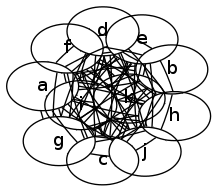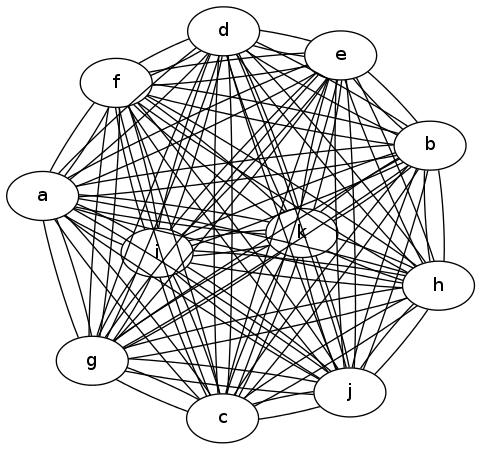I ran across a problem in Wikipedia that may mean it is about to explode. You decide.
You have heard about the danger of “combinatorial explosions” if we have more than one identifier. Every identifier has to be mapped to every other identifier.
Imagine that a – j represent different identifiers for the same subject.
This graphic represents a “small” combinatorial explosion.

If that looks hard to read, here is a larger version:

Is that better? 
Here is where I noticed the problem: the Wikipedia XML file has synonyms for the entries.
The article on anarchism has one hundred and one other names:
- af:Anargisme
- als:Anarchismus
- ar:لاسلطوية
- an:Anarquismo
- ast:Anarquismu
- az:Anarxizm
- bn:নৈরাজ্যবাদ
- zh-min-nan:Hui-thóng-tī-chú-gī
- be:Анархізм
- be-x-old:Анархізм
- bo:གཞུང་མེད་ལམ་སྲོལ།
- bs:Anarhizam
- br:Anveliouriezh
- bg:Анархизъм
- ca:Anarquisme
- cs:Anarchismus
- cy:Anarchiaeth
- da:Anarkisme
- pdc:Anarchism
- de:Anarchismus
- et:Anarhism
- el:Αναρχισμός
- es:Anarquismo
- eo:Anarkiismo
- eu:Anarkismo
- fa:آنارشیسم
- hif:Khalbali
- fo:Anarkisma
- fr:Anarchisme
- fy:Anargisme
- ga:Ainrialachas
- gd:Ain-Riaghailteachd
- gl:Anarquismo
- ko:아나키즘
- hi:अराजकता
- hr:Anarhizam
- id:Anarkisme
- ia:Anarchismo
- is:Stjórnleysisstefna
- it:Anarchismo
- he:אנרכיזם
- jv:Anarkisme
- kn:ಅರಾಜಕತಾವಾದ
- ka:ანარქიზმი
- kk:Анархизм
- sw:Utawala huria
- lad:Anarkizmo
- krc:Анархизм
- la:Anarchismus
- lv:Anarhisms
- lb:Anarchismus
- lt:Anarchizmas
- jbo:nonje’asi’o
- hu:Anarchizmus
- mk:Анархизам
- ml:അരാജകത്വവാദം
- mr:अराजकता
- arz:اناركيه
- ms:Anarkisme
- mwl:Anarquismo
- mn:Анархизм
- nl:Anarchisme
- ja:アナキズム
- no:Anarkisme
- nn:Anarkisme
- oc:Anarquisme
- pnb:انارکی
- ps:انارشيزم
- pl:Anarchizm
- pt:Anarquismo
- ro:Anarhism
- rue:Анархізм
- ru:Анархизм
- sah:Анархизм
- sco:Anarchism
- simple:Anarchism
- sk:Anarchizmus
- sl:Anarhizem
- ckb:ئانارکیزم
- sr:Анархизам
- sh:Anarhizam
- fi:Anarkismi
- sv:Anarkism
- tl:Anarkismo
- ta:அரசின்மை
- th:อนาธิปไตย
- tg:Анархизм
- tr:Anarşizm
- uk:Анархізм
- ur:فوضیت
- ug:ئانارخىزم
- za:Fouzcwngfujcujyi
- vec:Anarchismo
- vi:Chủ nghĩa vô chính phủ
- fiu-vro:Anarkism
- war:Anarkismo
- yi:אנארכיזם
- zh-yue:無政府主義
- diq:Anarşizm
- bat-smg:Anarkėzmos
- zh:无政府主义
Now you can imagine the “combinatorial explosion” that awaits the entry on anarchism in Wikipedia, one hundred and two names (102, including English) when compared to my ten identifiers.
Except that Wikipedia leaves the relationships between all these identifiers for anarchism unspecified.
You can call them into existence, one to the other, as needed, but then you assume the burden of processing them. All the identifiers remain available to other users for their purposes as well.
Hmmm, with the language prefixes mapping to scopes, this looks like a good source for names and variant names for topics in a topic map.
What do you think?
According to my software, this is post #4,000. Looking for ways to better deliver information about topic maps and their construction. Suggestions (not to mention support) welcome!


